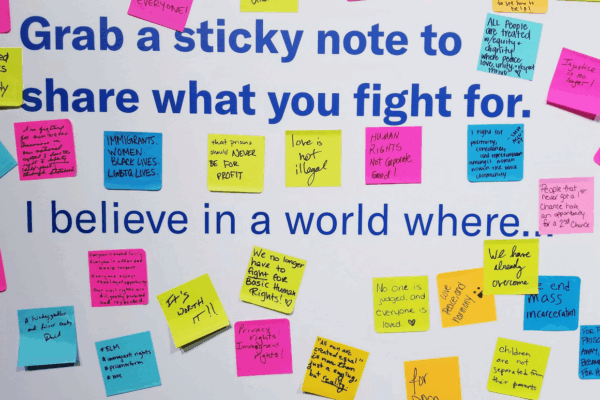Note: The views expressed here are the writer’s and not necessarily those of the ACLU of Virginia. This article was originally published here.
By Valley Haggard, a Richmond-based writer; teacher; founder of Richmond Young Writers, a writing camp for kids; and the brain behind Life in 10 Minutes project.
My mother has always been a rebel and an activist, with deep roots in the Jewish tradition of social justice, of never forget. At my mother's house there’s always room for one more at the table, there's always a meal to bring somewhere, a person or a cause to uplift. My mother brought me to my first march in Washington and she continues to show up at marches and rallies and protests again and again. She told me as she grows older she’s convinced her job is to be a body, to show up, to be counted.
Sometimes I’m ready to march, to protest, to call, to write, to rally. Sometimes the most revolutionary thing I can do in a day is figure out how to survive and take care of myself.
Sometimes I’m called to advocate for others, sometimes I have to learn to advocate for myself. Sometimes the healing work I’m called to do in the world is on the outside, sometimes it’s deep within.
Because of my 13 year-old son's passionate and prolific activism, this weekend my family was gifted the opportunity to listen to, learn from and meet some of the greatest social justice warriors of our time at the national ACLU Conference 2018: Bryan Stevenson, Elizabeth Warren, Patrisse Cullors, Andrea Ritchie, and about 100 other ridiculously smart and luminous revolutionaries. It was humbling, mind blowing, and deeply inspirational.
While Henry walked around with his briefcase confidently handing out business cards and introducing himself to Harvard Law Professors, Executive Directors of the ACLU, New York Times journalists, and the godparents of Yolanda Renee King, I hung back, proud as hell, but uncertain, too. It's fun and easy to imagine what this up and coming spunky go-getter young person and others like him will do to save the world, but what about the rest of us non-Harvard grads? What else can I do?
At least part of my answer, the kind that swoops through your gut and unfurls in your chest like wings, came during the last workshop on the last day with during a lecture by iconic civil rights activist Marshall Ganz, senior lecturer in public policy at the Kennedy School of Government at Harvard University (I swear to GOD, everyone at this conference was AT THE VERY LEAST a Harvard Law School grad). Marshall Ganz's #2 strategy for organizing, after relationship-building, was storytelling. "Emotion is not to be feared or marginalized," he told us. "It is to be learned from. It’s the emotional learning that enables us to turn reactions into responses. Story is how we do this." And there it was. There it IS. This deep truth that I KNOW. Stories teach. Stories heal. Stories connect and educate and inspire. Personal stories destroy stereotypes and ignite compassion, for others, for our selves and for the world we live in. My passion is already providing a safe and sacred space for stories to be written and providing a platform where those stories can be heard.
And now I'm ready to take it to the next level. I have some ideas. I've made some phone calls. Some things are in motion. I hope you'll consider telling me your story while mine continues to unfold. Stay tuned.

